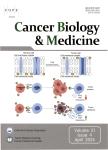Protein convertase subtilisin/Kexin type 9 inhibits hepatocellular carcinoma growth by interacting with GSTP1 and suppressing the JNK signaling pathway
Protein convertase subtilisin/Kexin type 9 inhibits hepatocellular carcinoma growth by interacting with GSTP1 and suppressing the JNK signaling pathway作者机构:Department of Gastroenterologythe First Affiliated Hospital of Nanchang UniversityNanchang 330006China Liver Cancer InstituteZhongshan HospitalFudan UniversityShanghai 200032China Department of CardiologyJiangxi Provincial People’s Hospital Affiliated to Nanchang UniversityNanchang 330006China Department of OncologyThe First Affiliated Hospital of Wenzhou Medical UniversityWenzhou 325000China
出 版 物:《Cancer Biology & Medicine》 (癌症生物学与医学(英文版))
年 卷 期:2022年第19卷第1期
页 面:90-103页
核心收录:
学科分类:1002[医学-临床医学] 1001[医学-基础医学(可授医学、理学学位)] 100214[医学-肿瘤学] 10[医学]
基 金:supported by grants from the National Natural Science Foundation of China(Grant No.81802461) the Jiangxi Provincial Department of Science and Technology(Grant No.20202ACBL216012) the Education Department of Jiangxi Province(Grant No.GJJ170010)。
主 题:Hepatocellular carcinoma growth PCSK9 GSTP1 JNK
摘 要:Objective:Protein convertase subtilisin/Kexin type 9(PCSK9)has been found to be closely associated with the occurrence and development of numerous tumors.However,the precise role of PCSK9 and its relationship to the development of hepatocellular carcinoma(HCC)remain largely unknown.This study aimed to clarify these issues.Methods:The expression levels of PCSK9 in HCC tissues and HCC cell lines were determined by the quantitative reverse transcription polymerase chain reaction,Western blot,and immunohistochemical analyses,and the effects of PCSK9 expression on HCC cell biological traits were investigated by overexpressing and downregulating PCSK9 expression in vivo and in vitro.Additionally,the mechanism by which PCSK9 mediated dissociation of glutathione S-transferase Pi 1(GSTP1)dimers and phosphorylation of the Jun N-terminal kinase(JNK)pathway components were investigated.Results:PCSK9 expression levels were significantly lower in HCC tissues than in adjacent non-tumor samples.In vivo and in vitro experiments suggested that PCSK9 inhibited HCC cell proliferation and metastasis.Further analysis showed that PCSK9 interacted with GSTP1 and promoted GSTP1 dimer dissociation and JNK signaling pathway inactivation in HCC cells.Moreover,the relationships between PCSK9 protein expressions and clinical outcomes were investigated.The PCSK9-lo group displayed a significantly shorter overall survival(OS;median OS:64.2 months vs.83.2 months;log-rank statistic:4.237;P=0.04)and recurrencefree survival(RFS;median RFS:26.5 months vs.46.6 months;log-rank statistic:10.498;P=0.001)time than the PCSK9-hi group.Conclusions:PCSK9 inhibited HCC cell proliferation,cell cycle progression,and apoptosis by interacting with GSTP1 and suppressing JNK signaling,suggesting that PCSK9 might act as a tumor suppressor and be a therapeutic target in HCC patients.



